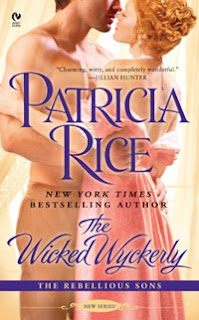 A big Riskies welcome to Patricia Rice and her July 2010 release, THE WICKED WYCKERLY. In her own words ….
A big Riskies welcome to Patricia Rice and her July 2010 release, THE WICKED WYCKERLY. In her own words ….
That’s where you’ll find my much-maligned Earl of Danecroft and his…umm…spirited daughter. Poor chap, his irresponsible bachelor’s life has just come to a crashing, nearly fatal, end with the inheritance of a bankrupt earldom and the arrival of a six-year-old dispenser of flaming dragon dung. Where’s a wealthy, understanding woman when one needs one?
 Tell us about your inspiration for The Wicked Wyckerly and the
Rebellious Sons Series.
Tell us about your inspiration for The Wicked Wyckerly and the
Rebellious Sons Series.
My editor and I were brainstorming at RWA in San Francisco. I told her I was tired of dukes and lords and wanted to write about younger sons. I also had this idea about a bankrupt hero who grabs his daughter and runs. And another idea about a wealthy widow who grants bequests to deserving spinsters—sort of a Cinderella story. And by the time we were done, the whole series came together!
Your blurb for the book sounds straight out of Heyer (that’s a compliment!)–a tribute to Frederica. Who are your influences?
Why, thank you! I came late to Heyer, reading them when I first became enamored of the Walker Regencies in our very limited small town library. I had read and re-read Austen regularly since childhood but didn’t know there was an entire category of Regency romances out there. I fell in love instantly. I believe I read Patricia Veryan, and Jo Beverley, and Loretta Chase first, and once I realized I could buy the paperbacks, I drove thirty miles to a bookstore and haven’t stopped reading them since. I still re-read those old favorites. Heyer is on my bookshelf but to be truthful, I don’t have her memorized, so I had no idea the story was similar!
Did you run into any interesting research for this book?
Exploring bankruptcy among the ton proved gambling was just as ruinous as our books portray. Some of the wealthiest, most powerful aristocrats were so addicted that they died owing more than they ever earned—to tradesmen, because gambling debts had to be paid immediately. Of course, there were others who simply thought money flowed like water and spent it acquiring enormously expensive collections until their debtors came knocking. Aristocrats couldn’t be thrown in debtor’s prison, but their debtors could go to court and seek restitution by stripping their homes of everything they owned. Which is why my Fitz walked such a precarious line…
You’re a very prolific writer, writing in at least three subgenres– historical, paranormal, contemporary. How do you get yourself in a Regency mindset and set the mood for writing historicals?
I have a weird brain.
What do you like about the Regency period? Dislike?
I think what I like most is the contrast of politeness of manners to actual behavior. There were all these rules about how to dress for when and where and how to leave cards and even which road a lady is allowed to walk down—and I suppose anyone conquering all these rules felt very secure. But underneath that gentility was a population just coming out of the bawdy Georgian era where once the heir and spare were in place, anything went sexually. So it’s quite reasonable to write about a repressed spinster and a dashing rake, or a polite scholar and a seductive widow, and characters who aren’t certain what is expected of them. Built-in conflict! Oh, and the clothes, of course.
I’m not entirely certain that there’s anything I particularly dislike about the Regency, from an author’s point of view. There was much to dislike in the era itself, from the lack of running water to the crime-ridden slums and the horrendous criminal system. But as a writer, those make for fantastic stories, so I can’t dislike them.
Our standard question: What makes your books risky?
Each book presents a different risk, a different challenge. I get bored if I’m not sticking my neck out and being perverse. Writing a series about the younger sons of aristocracy instead of the usual dukes, of whom there seem to be three per square inch in romance, is a market risk. Writing a romp after my darker historical trilogy was a challenge to myself, and possibly another market risk since everyone is reading dark these days. But if we’re not pushing boundaries, then we’re simply regurgitating what’s already out there, and who wants that?
What do you like to do when not writing?
Read! I need more reading time! I garden and travel and visit with family when I can, but I’m always reading.
When will the next Rebellious Sons book come out and can you give us a hint of what it will be about?
The next book is THE DEVILISH MONTAGUE. Blake has a brain like an encyclopedia but nowhere to use it, so he vents his frustrations physically by nearly getting himself killed in duels and races and war, like any good Corinthian. Until he meets his Waterloo in a woman all society calls Ladybyrd and suddenly, instead of endangering his own life, someone else is trying to take it. Trying to protect his woman, her parrot, and his life presents more challenge than he’s ever been up against.
The Riskies will choose one a winner from today’s conversation to receive a signed copy of the book, so let’s chat!
How many of you enjoy becoming involved in a series world? And those who do not, why?
